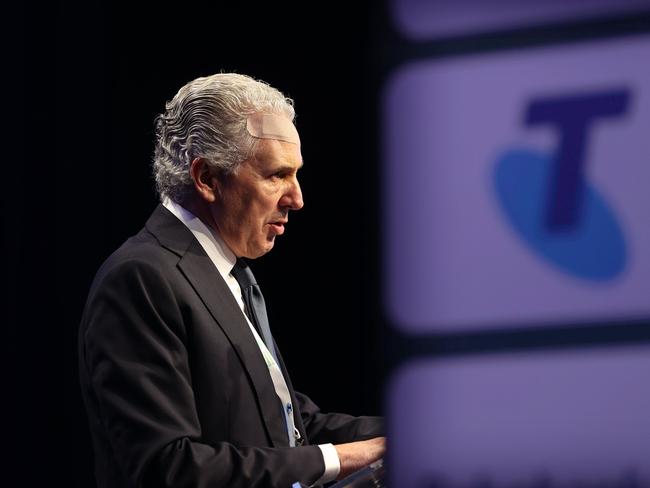Telstra-TPG deal ‘overturns 30 years of telco policy’: Optus
Optus ramps up attacks on its two rivals, heaping pressure on the competition watchdog which is set to rule on their billion-dollar network sharing deal.

A proposed billion dollar regional network sharing deal between Telstra and TPG would undo 30 years of regulatory and policy work and negatively impact the economy and jobs growth across Australia’s regions, warns the nation’s second biggest telco Optus.
An executive summary of Optus’ formal submission to the competition and consumer watchdog, seen by The Australian, calls the proposed deal between its two rivals a “regional network merger” that would further enhance Telstra’s already dominant position, leading to lower levels of economic activity and jobs growth for the regions as a result.
The Australian Competition & Consumer Commission recently completed a two-week consultation process and will make a ruling on the merger in October.
Optus is calling on the regulator to nix the deal which would see TPG share 3700 of Telstra’s 11,000 towers, and give Telstra access to TPG’s low-band mobile spectrum. TPG will pay Telstra between $1.6bn and $1.8bn over 10 years for the access.
Optus’ submission will significantly ramp up pressure on the ACCC, which is acutely aware of Australia’s telecommunications competition issues, having unsuccessfully tried to block the blockbuster merger between TPG and Vodafone which it argued in Federal Court would lead to higher prices.
“If this merger is permitted to proceed it will overturn 30 years of regulatory and policy settings that the successive governments and the ACCC have championed to promote competition and investment in the telecommunications sector,” Optus said in its submission.
“It will further entrench and extend the dominant market position of Telstra which will undermine the commercial viability of additional investment in regional infrastructure (which TPG is abandoning) by Optus or any other potential entrant, ‘locking’ competition out of the regional market and eliminating choice in regional Australia.”
Optus said Telstra enjoys a national mobile market share of 51 per cent, and close to 70 per cent in the regions. It said that should the deal proceed, consumers can expect higher prices nationally, lower overall investment in the communications market, lower network and service quality, less choice for regional consumers and less resiliency in the nation‘s communications infrastructure.
“The proposed network merger will not improve community or customer outcomes. If approved, it will have major adverse and irreversible consequences for the communications sector and ordinary Australians, especially those living in our regions.
“Having decommissioned over 700 of its regional mobile sites, TPG will lose flexibility to change course meaning this arrangement will be irreversible over the long-term.
“TPG will be in a weak position to renegotiate favourable terms when the proposed transaction is up for renewal at a time when Telstra will potentially have a monopoly position in some regional areas.”
James Rickards, TPG Telecom general manager of external affairs, said in response that Optus is “twisting the facts to stop what it knows is a pro-competitive change to the mobile market”.
“TPG’s entire reason for this deal is to increase the size of its network so it can win customers from both Telstra and Optus, meaning all mobile consumers will benefit from greater choice and competition.”

“Under the network sharing deal, we will go from having 5,500 sites with only a small number in regional areas, to around 8,500 mobile sites across metro and regional Australia connected into our core network where service quality, pricing and product differentiation are all controlled by us.
“It will strengthen the mobile services offered by our family of brands and will create a third real regional mobile network operator in Australia. Optus’s threat to not invest in regional Australia because of the arrival of a third provider does not make sense. It will now have every incentive to continue investing. Optus is afraid of having its regional duopoly exposed to the forces of competition for the first time,” Mr Rickards said.
A Telstra spokeswoman said the deal would be positive for regional Australia particularly given the rapid demand for data in the regions.

“It will unleash new mobile capacity in regional Australia through use of under-utilised spectrum in thousands of regional sites, as well as enabling new competition and choice. This deal will enable regional Australia to be more connected than ever before,” she said.
“Optus’ only reason for opposing the deal is self-interest – it would rather protect its own position than support an innovative deal to provide more capacity and competition in regional Australia.”
Nationals leader David Littleproud earlier this month described Telstra’s dominance in the regions as a “cancer”, and says the proposal for the company to share its network with rival TPG will be an early test of the Albanese government.
“Looking on the surface, when [Telstra chief executive] Andy Penn came out and did a big sales pitch it all looked rosy, but as with anything with Andy Penn you need to scratch beneath the surface,” Mr Littleproud told The Australian.
“There is concern that Telstra is actually going to continue to abandon the bush … This will be about just transferring assets and spectrum and shutting down existing assets just to take control of what TPG had.”
Telstra CEO Andy Penn called those comments “complete rubbish” and said after nine years in government Mr Littleproud had “failed to deliver anything for the bush”.
Commpete, the telco challenger alliance, also published its submission this week and called for Telstra to allow wholesale access through its mobile networks to ensure fair competition for other telco providers.
“Entrenching Telstra’s dominance in regional Australia will hand it control to dictate price rises for mobile telecommunications in regional communities,” chair Michelle Lim said.”If the ACCC permits it to go ahead, the government will be handing over essential services to a single private enterprise without regulatory guardrails in place to guarantee value, flexibility, and choice for the long-term interests of the Australian public.”
A spokeswoman for Communications Minister Michelle Rowland said the government is continuing to monitor developments. The ACCC is expected to issue its ruling in October.




To join the conversation, please log in. Don't have an account? Register
Join the conversation, you are commenting as Logout